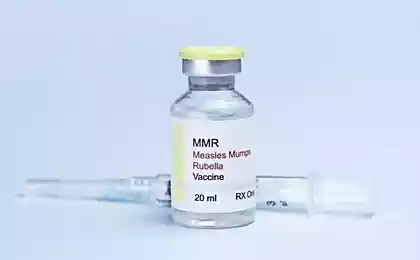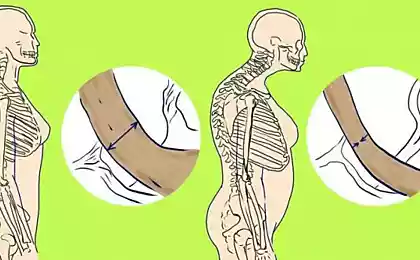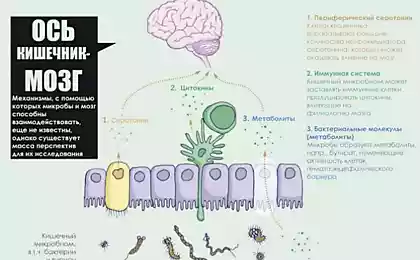678
Reveals the connection between vitamin D deficiency and autism
When I was a medical student (32 years ago), the incidence of autism was 1 per 10,000 people today, according to the CDC, the incidence jumped to less than 1 in 50 people.
According to the forecasts of reputable experts in 10-20 years, HALF of all children will be autistic disorder in some capacity.
How can a prosperous culture, if each child has impaired function of the brain? No way. This is a recipe for the collapse of society. It is obvious that something must be done to curb this avalanche.

But what can a parent do to reduce the risk for your child?
Doctor of science, biologist Rhonda Patrick, published two articles that talk about a very interesting simple but effective lifestyle changes that can have a huge impact not only on autism but on a number of other developmental disorders in children.
VITAMIN D IS AN IMPORTANT REGULATOR OF GENES
To understand why vitamin D plays such an important role in brain function, it is important to know what is the vitamin D. Despite the word "vitamin", it actually is converted into a steroid hormone (to other steroid hormones include estrogen and testosterone).
As a steroid hormone, it regulates over 1000 different physiological processes, and controls about 5% of the human genome. Dr. Michael Holick, a leading vitamin D researcher, believes that he can even control two times more genes.
Having enough vitamin D, the body binds the vitamin D receptor located throughout the body.
A set of receptors of vitamin D penetrates deeply into DNA, where it recognizes the signal sequence of code that gives the user a complex of vitamin D receptor on the inclusion of gene (bring it) or disable it (stop its action).
Is that what those little signal sequences are present in 10% of all genes, but according to Patrick, empirically it's not proven that vitamin D has the ability to activate or deactivate these genes.
AUTISM IS GROWING IN TANDEM WITH VITAMIN D DEFICIENCY
Despite the fact that autism is likely not caused by any one factor, it is worth noting that the incidence of autism has increased along with the increase in the deficit of vitamin D.
"The rising incidence of autism correlates with the rise of vitamin D deficiency, mainly due to the fact that people use sunscreen and more are in the room. UV radiation is very important for the production of vitamin D in the skin, says Patrick.-My joint with Dr. Bruce Ames ' research at children's hospital Oakland research Institute (CHORI) showed that one of the genes regulated by vitamin D, encodes the enzyme called the tryptophan hydroxylase (TPH).
TPH is responsible for the conversion of tryptophan (a rare amino acid that you get from the intake of proteins) in serotonin.
Serotonin is a neurotransmitter in the brain which regulates mood. It is important for good health. But, in fact, its functions in the brain much more during the development of the brain and other body parts."
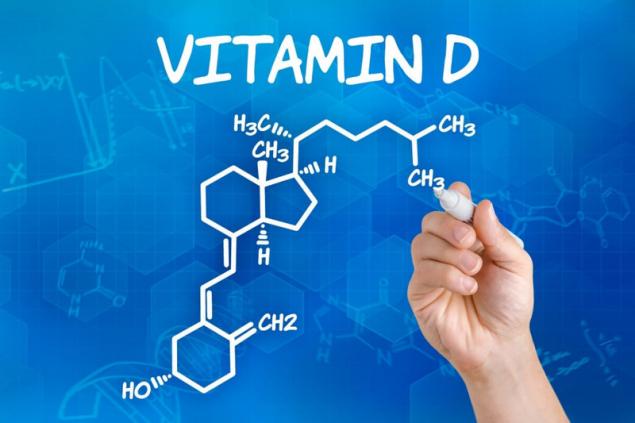
SEROTONIN IN THE GUT AND SEROTONIN IN THE BRAIN
The body has two different gene triptofangidroksilazy — one in the brain (TPH2) and one in the gut (TPH1).
Contrary to popular belief, the latter does NOT cross the blood-brain barrier to enter the brain. These are two completely separate systems of serotonin.
This is very important because, despite the understanding that the majority (about 90%) of serotonin in the body is produced in the intestines, not the brain, it is believed that the serotonin produced in the gut, automatically affects the level of serotonin in the brain.
Serotonin produced in the gut, performs, nevertheless, a vital function, playing a role in the ability of platelets (blood cell type) respond to tissue damage. On the other hand, it can cause problems, contributing to inflammation.
VITAMIN D CONTROLS THE SEROTONIN IN THE GUT
Patrick found that in the intestine vitamin D turns off or suppresses the activity of the gene responsible for the production of an enzyme that converts tryptophan to serotonin. Thus, vitamin D helps to fight inflammation in the bowel caused by excessive levels of serotonin.
In the brain the gene triptofangidroksilazy has a sequence that causes the opposite reaction. Here vitamin D activates the gene, thereby increasing the production of serotonin! Obviously, when a sufficient amount of vitamin D at the same time two things happen:
1. Decreases intestinal inflammation due to disconnection of the gene associated with the production of serotonin.
2. The level of serotonin in the brain increases due to the activation of a gene in the brain called serotonin is responsible for mood, impulse control, long term planning, long-term behavior, anxiety, memory and many other cognitive functions and behaviors, including sensory Gating — the ability to filter out extraneous or irrelevant stimuli.
Since the publication of the first article Patrick in 2014, an independent team at the University of Arizona conducted a biochemical verification of its conclusions and confirmed that vitamin D activates the gene triptofangidroksilazy 2 (TPH2) in different types of neuronal cells.
THE ROLE OF SEROTONIN IN EARLY BRAIN DEVELOPMENT
During the intrauterine stage of development of the brain serotonin plays an important role in the morphogenesis of the brain. Simply put, serotonin is the ingredient necessary to shape the brain, the formation of its structure and internal connections. Serotonin, as it tells the neurons where they reside in the brain, and what type of neurons they are supposed to be. If there is not enough serotonin, disturbances of brain structure and its internal connections.
"In studies on mice it was found that it leads to a mouse equivalent of autism behavior, says Dr. Patrick. — Serotonin plays a very important role in brain development. Of particular interest is the fact that the developing fetus is totally dependent on vitamin D levels in the mother.
Vitamin D from the mother crosses the placenta, enters the blood-brain barrier, enters the brain and activates all of those embryonic genes.
Vitamin D deficiency in the mother can have serious consequences for the developing brain of the fetus because it may not be activated gene, which is essential for vitamin D. As a result, the fetal brain produces enough serotonin, which may affect brain development...
Many researchers find a link between autism and low vitamin D levels and serotonin. But no one brought it into a single mechanism: "Look, maybe low vitamin D leads to low serotonin levels in the developing brain? This may explain the rise of autism, and perhaps partly why low vitamin D causes autism."

MATERNAL AUTOIMMUNITY AND AUTISM
Autism is associated with maternal autoimmunity. Mothers of children with autism, four times more likely to have antibodies to the proteins of the fetal brain. Antibodies to brain proteins in the blood are not the norm, but they are often found in mothers of children with autism.
Studies have found that if the monkey to trigger a very strong autoimmune reaction during pregnancy, this leads to improper brain development in the offspring. Simply put, the autoimmune response isn't good for anyone, but for a pregnant woman, its effects are truly devastating.
"For those who in these matters is not strong, autoimmunity means that the immune system is so activated that begins to believe their own tissue to something foreign, like bacteria or viruses, in that time, as it's not foreign, it is your own body is your own tissue, explains Patrick.- Your immune cells, for a variety of reasons, do not recognize them and therefore begin to attack and damage the tissue. In the case of pregnancy is the embryo that grows in a small developing fetus. And your body considers it foreign. The body seems to think: "well, what is this here? It should not be here. Attack! To get rid of!" This can cause a very serious autoimmune reaction.
But in our body has a wonderful protective mechanism that does not permit this. We can develop a special type of immune cells — T regulatory cells (T-regs). They are very important because they check the immune system, ensure that she could distinguish the alien from his own..."
VITAMIN D DEFICIENCY CAN STIMULATE AN AUTOIMMUNE REACTION IN PREGNANT
As we have said, in the intestine there is an enzyme that converts tryptophan to serotonin. In pregnant women, the same enzyme found in the placenta; that is, during pregnancy tryptophan can be converted to serotonin in the placenta.
The second way is the metabolism of tryptophan in kynurenine, which, in turn, forms an important regulatory T-cells that help to suppress the autoimmune response. If something blocks the formation of kynurenine of tryptophan, the number of regulatory T-cells falls, and autoimmune reactions of the body increase.
In animal studies, pregnant mice, which was deleted, the enzyme that produces kynurenine had such a strong autoimmune response to the fetus, which eventually led to the termination of pregnancy.
"Thus, it would be good to make sure that not all of the tryptophan is converted to serotonin in the placenta, says Patrick, but also to ensure its transformation in the second path, in regulatory T cells... Now back to the vitamin D. If you lack vitamin D, you can develop a lot more of this enzyme that binds tryptophan. However, he, like a funnel, which delayed the tryptophan, and falls on the way production of serotonin in the placenta.
Thus, tryptophan has no chance to evaluate the path that forms kynurenine and regulatory T cells. This can have a negative effect, especially during pregnancy, because it reduces the production of regulatory T-cells and increases the autoimmune response".
Vitamin D is associated with autoimmunity in a variety of different mechanisms, and, according to Patrick, this may be another way by which vitamin D can regulate the autoimmune response. In short, it helps to suppress the enzyme that so tightly binds tryptophan that holds it, not allowing to form kynurenine and regulatory T cells. In the presence of sufficient amounts of vitamin D tryptophan can use both paths and form:
— serotonin is in the gut and placenta;
— kynurenine and T-regulatory cells, which helps to verify the autoimmune response.
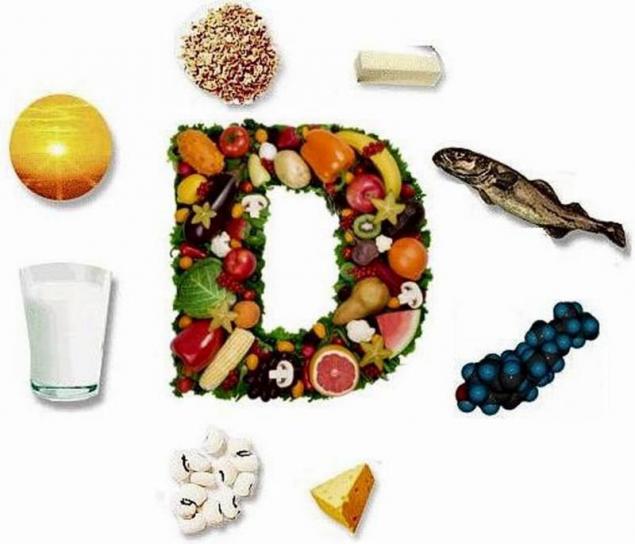
IF YOU ARE PREGNANT – BE SURE TO OPTIMIZE VITAMIN D LEVELS
Optimizing vitamin D levels is of particular importance during pregnancy. In fact, optimizing your vitamin D levels before pregnancy and during it can be one of the most important actions that the pregnant mother may take in order to have a healthy baby.
"For practicing obstetrician-gynecologists, regular family doctors or to any woman who wants to get pregnant or are already pregnant, there's a simple solution, namely: 1) to measure the level of vitamin D and 2) taking supplements. Make sure you get vitamin D in sufficient quantity to maintain the optimal level that you have not experienced the deficit - recommends Patrick.- I think that this simple solution may help to prevent diseases such as autism and other diseases – ADHD, schizophrenia and various disorders of the brain. As mentioned, serotonin plays an important role in various forms of behavior."
The above mechanism probably also plays a role in the overall regulation of autoimmune responses by stimulating the production of regulatory T-cells. Therefore, ALL WHO SUFFER FROM AUTOIMMUNE DISORDERS, it is STRONGLY RECOMMENDED to OPTIMIZE LEVELS of VITAMIN D. The same applies to people with neurological disorders.
Speaking about the optimal level of vitamin D, most studies agree on the fact that the ideal range is 40 to 70 nanograms per milliliter (ng/ml). Definitely a level below 40 is bad, as we already know. Best of all — around 50. The perfect way to optimize your levels is to provide a broad area of uncovered skin to sunlight. If you are not able enough to be in the sun, you will need to take a Supplement with vitamin D3.
Keep in mind that taking supplements with vitamin D, you will need to take vitamin K2. The biological role of vitamin K2 is to help move calcium into the appropriate areas of the body like the bones and teeth. It also helps remove calcium from areas where it should not be, for example, from the arteries and soft tissues.
A deficiency of vitamin K2 causes the symptoms of vitamin D toxicity, which include pathological calcification that can cause hardening of the arteries.
A common gene polymorphism predisposes to low vitamin D levels!
It is worth noting that quite a large part of the population has a polymorphism of the gene CYP2R1 is a genetic disorder in which the liver fails gidrauxilirovaniu vitamin D3 25-hydroxy vitamin D, which is the main circulating form of vitamin D in the body. In this case, the amount of vitamin D, which you will need to take, can be extremely high.published
From Dr. Mercola
The materials are for informational purposes. Remember, self-life-threatening, for advice regarding the use of any medicines and methods of treatment, contact your doctor.
Also interesting: Caesarean section and autism, the relationship of gut and brain
Vaccination as a possible cause of autism
Source: russian.mercola.com/sites/articles/archive/2016/04/04/%D0%B2%D0%B8%D1%82%D0%B0%D0%BC%D0%B8%D0%BD-d-%D0%B0%D1%83%D1%82%D0%B8%D0%B7%D0%BC.aspx
According to the forecasts of reputable experts in 10-20 years, HALF of all children will be autistic disorder in some capacity.
How can a prosperous culture, if each child has impaired function of the brain? No way. This is a recipe for the collapse of society. It is obvious that something must be done to curb this avalanche.

But what can a parent do to reduce the risk for your child?
Doctor of science, biologist Rhonda Patrick, published two articles that talk about a very interesting simple but effective lifestyle changes that can have a huge impact not only on autism but on a number of other developmental disorders in children.
VITAMIN D IS AN IMPORTANT REGULATOR OF GENES
To understand why vitamin D plays such an important role in brain function, it is important to know what is the vitamin D. Despite the word "vitamin", it actually is converted into a steroid hormone (to other steroid hormones include estrogen and testosterone).
As a steroid hormone, it regulates over 1000 different physiological processes, and controls about 5% of the human genome. Dr. Michael Holick, a leading vitamin D researcher, believes that he can even control two times more genes.
Having enough vitamin D, the body binds the vitamin D receptor located throughout the body.
A set of receptors of vitamin D penetrates deeply into DNA, where it recognizes the signal sequence of code that gives the user a complex of vitamin D receptor on the inclusion of gene (bring it) or disable it (stop its action).
Is that what those little signal sequences are present in 10% of all genes, but according to Patrick, empirically it's not proven that vitamin D has the ability to activate or deactivate these genes.
AUTISM IS GROWING IN TANDEM WITH VITAMIN D DEFICIENCY
Despite the fact that autism is likely not caused by any one factor, it is worth noting that the incidence of autism has increased along with the increase in the deficit of vitamin D.
"The rising incidence of autism correlates with the rise of vitamin D deficiency, mainly due to the fact that people use sunscreen and more are in the room. UV radiation is very important for the production of vitamin D in the skin, says Patrick.-My joint with Dr. Bruce Ames ' research at children's hospital Oakland research Institute (CHORI) showed that one of the genes regulated by vitamin D, encodes the enzyme called the tryptophan hydroxylase (TPH).
TPH is responsible for the conversion of tryptophan (a rare amino acid that you get from the intake of proteins) in serotonin.
Serotonin is a neurotransmitter in the brain which regulates mood. It is important for good health. But, in fact, its functions in the brain much more during the development of the brain and other body parts."

SEROTONIN IN THE GUT AND SEROTONIN IN THE BRAIN
The body has two different gene triptofangidroksilazy — one in the brain (TPH2) and one in the gut (TPH1).
Contrary to popular belief, the latter does NOT cross the blood-brain barrier to enter the brain. These are two completely separate systems of serotonin.
This is very important because, despite the understanding that the majority (about 90%) of serotonin in the body is produced in the intestines, not the brain, it is believed that the serotonin produced in the gut, automatically affects the level of serotonin in the brain.
Serotonin produced in the gut, performs, nevertheless, a vital function, playing a role in the ability of platelets (blood cell type) respond to tissue damage. On the other hand, it can cause problems, contributing to inflammation.
VITAMIN D CONTROLS THE SEROTONIN IN THE GUT
Patrick found that in the intestine vitamin D turns off or suppresses the activity of the gene responsible for the production of an enzyme that converts tryptophan to serotonin. Thus, vitamin D helps to fight inflammation in the bowel caused by excessive levels of serotonin.
In the brain the gene triptofangidroksilazy has a sequence that causes the opposite reaction. Here vitamin D activates the gene, thereby increasing the production of serotonin! Obviously, when a sufficient amount of vitamin D at the same time two things happen:
1. Decreases intestinal inflammation due to disconnection of the gene associated with the production of serotonin.
2. The level of serotonin in the brain increases due to the activation of a gene in the brain called serotonin is responsible for mood, impulse control, long term planning, long-term behavior, anxiety, memory and many other cognitive functions and behaviors, including sensory Gating — the ability to filter out extraneous or irrelevant stimuli.
Since the publication of the first article Patrick in 2014, an independent team at the University of Arizona conducted a biochemical verification of its conclusions and confirmed that vitamin D activates the gene triptofangidroksilazy 2 (TPH2) in different types of neuronal cells.
THE ROLE OF SEROTONIN IN EARLY BRAIN DEVELOPMENT
During the intrauterine stage of development of the brain serotonin plays an important role in the morphogenesis of the brain. Simply put, serotonin is the ingredient necessary to shape the brain, the formation of its structure and internal connections. Serotonin, as it tells the neurons where they reside in the brain, and what type of neurons they are supposed to be. If there is not enough serotonin, disturbances of brain structure and its internal connections.
"In studies on mice it was found that it leads to a mouse equivalent of autism behavior, says Dr. Patrick. — Serotonin plays a very important role in brain development. Of particular interest is the fact that the developing fetus is totally dependent on vitamin D levels in the mother.
Vitamin D from the mother crosses the placenta, enters the blood-brain barrier, enters the brain and activates all of those embryonic genes.
Vitamin D deficiency in the mother can have serious consequences for the developing brain of the fetus because it may not be activated gene, which is essential for vitamin D. As a result, the fetal brain produces enough serotonin, which may affect brain development...
Many researchers find a link between autism and low vitamin D levels and serotonin. But no one brought it into a single mechanism: "Look, maybe low vitamin D leads to low serotonin levels in the developing brain? This may explain the rise of autism, and perhaps partly why low vitamin D causes autism."

MATERNAL AUTOIMMUNITY AND AUTISM
Autism is associated with maternal autoimmunity. Mothers of children with autism, four times more likely to have antibodies to the proteins of the fetal brain. Antibodies to brain proteins in the blood are not the norm, but they are often found in mothers of children with autism.
Studies have found that if the monkey to trigger a very strong autoimmune reaction during pregnancy, this leads to improper brain development in the offspring. Simply put, the autoimmune response isn't good for anyone, but for a pregnant woman, its effects are truly devastating.
"For those who in these matters is not strong, autoimmunity means that the immune system is so activated that begins to believe their own tissue to something foreign, like bacteria or viruses, in that time, as it's not foreign, it is your own body is your own tissue, explains Patrick.- Your immune cells, for a variety of reasons, do not recognize them and therefore begin to attack and damage the tissue. In the case of pregnancy is the embryo that grows in a small developing fetus. And your body considers it foreign. The body seems to think: "well, what is this here? It should not be here. Attack! To get rid of!" This can cause a very serious autoimmune reaction.
But in our body has a wonderful protective mechanism that does not permit this. We can develop a special type of immune cells — T regulatory cells (T-regs). They are very important because they check the immune system, ensure that she could distinguish the alien from his own..."
VITAMIN D DEFICIENCY CAN STIMULATE AN AUTOIMMUNE REACTION IN PREGNANT
As we have said, in the intestine there is an enzyme that converts tryptophan to serotonin. In pregnant women, the same enzyme found in the placenta; that is, during pregnancy tryptophan can be converted to serotonin in the placenta.
The second way is the metabolism of tryptophan in kynurenine, which, in turn, forms an important regulatory T-cells that help to suppress the autoimmune response. If something blocks the formation of kynurenine of tryptophan, the number of regulatory T-cells falls, and autoimmune reactions of the body increase.
In animal studies, pregnant mice, which was deleted, the enzyme that produces kynurenine had such a strong autoimmune response to the fetus, which eventually led to the termination of pregnancy.
"Thus, it would be good to make sure that not all of the tryptophan is converted to serotonin in the placenta, says Patrick, but also to ensure its transformation in the second path, in regulatory T cells... Now back to the vitamin D. If you lack vitamin D, you can develop a lot more of this enzyme that binds tryptophan. However, he, like a funnel, which delayed the tryptophan, and falls on the way production of serotonin in the placenta.
Thus, tryptophan has no chance to evaluate the path that forms kynurenine and regulatory T cells. This can have a negative effect, especially during pregnancy, because it reduces the production of regulatory T-cells and increases the autoimmune response".
Vitamin D is associated with autoimmunity in a variety of different mechanisms, and, according to Patrick, this may be another way by which vitamin D can regulate the autoimmune response. In short, it helps to suppress the enzyme that so tightly binds tryptophan that holds it, not allowing to form kynurenine and regulatory T cells. In the presence of sufficient amounts of vitamin D tryptophan can use both paths and form:
— serotonin is in the gut and placenta;
— kynurenine and T-regulatory cells, which helps to verify the autoimmune response.

IF YOU ARE PREGNANT – BE SURE TO OPTIMIZE VITAMIN D LEVELS
Optimizing vitamin D levels is of particular importance during pregnancy. In fact, optimizing your vitamin D levels before pregnancy and during it can be one of the most important actions that the pregnant mother may take in order to have a healthy baby.
"For practicing obstetrician-gynecologists, regular family doctors or to any woman who wants to get pregnant or are already pregnant, there's a simple solution, namely: 1) to measure the level of vitamin D and 2) taking supplements. Make sure you get vitamin D in sufficient quantity to maintain the optimal level that you have not experienced the deficit - recommends Patrick.- I think that this simple solution may help to prevent diseases such as autism and other diseases – ADHD, schizophrenia and various disorders of the brain. As mentioned, serotonin plays an important role in various forms of behavior."
The above mechanism probably also plays a role in the overall regulation of autoimmune responses by stimulating the production of regulatory T-cells. Therefore, ALL WHO SUFFER FROM AUTOIMMUNE DISORDERS, it is STRONGLY RECOMMENDED to OPTIMIZE LEVELS of VITAMIN D. The same applies to people with neurological disorders.
Speaking about the optimal level of vitamin D, most studies agree on the fact that the ideal range is 40 to 70 nanograms per milliliter (ng/ml). Definitely a level below 40 is bad, as we already know. Best of all — around 50. The perfect way to optimize your levels is to provide a broad area of uncovered skin to sunlight. If you are not able enough to be in the sun, you will need to take a Supplement with vitamin D3.
Keep in mind that taking supplements with vitamin D, you will need to take vitamin K2. The biological role of vitamin K2 is to help move calcium into the appropriate areas of the body like the bones and teeth. It also helps remove calcium from areas where it should not be, for example, from the arteries and soft tissues.
A deficiency of vitamin K2 causes the symptoms of vitamin D toxicity, which include pathological calcification that can cause hardening of the arteries.
A common gene polymorphism predisposes to low vitamin D levels!
It is worth noting that quite a large part of the population has a polymorphism of the gene CYP2R1 is a genetic disorder in which the liver fails gidrauxilirovaniu vitamin D3 25-hydroxy vitamin D, which is the main circulating form of vitamin D in the body. In this case, the amount of vitamin D, which you will need to take, can be extremely high.published
From Dr. Mercola
The materials are for informational purposes. Remember, self-life-threatening, for advice regarding the use of any medicines and methods of treatment, contact your doctor.
Also interesting: Caesarean section and autism, the relationship of gut and brain
Vaccination as a possible cause of autism
Source: russian.mercola.com/sites/articles/archive/2016/04/04/%D0%B2%D0%B8%D1%82%D0%B0%D0%BC%D0%B8%D0%BD-d-%D0%B0%D1%83%D1%82%D0%B8%D0%B7%D0%BC.aspx















